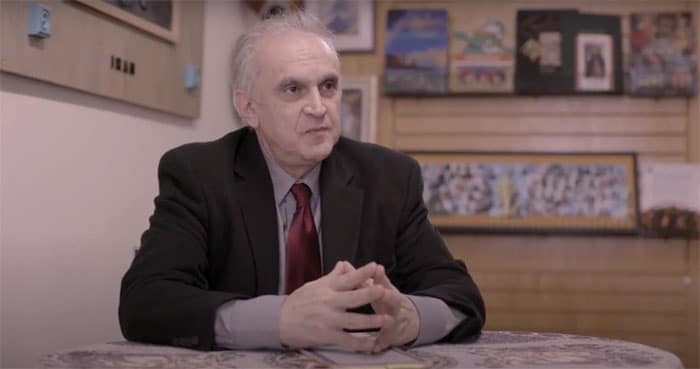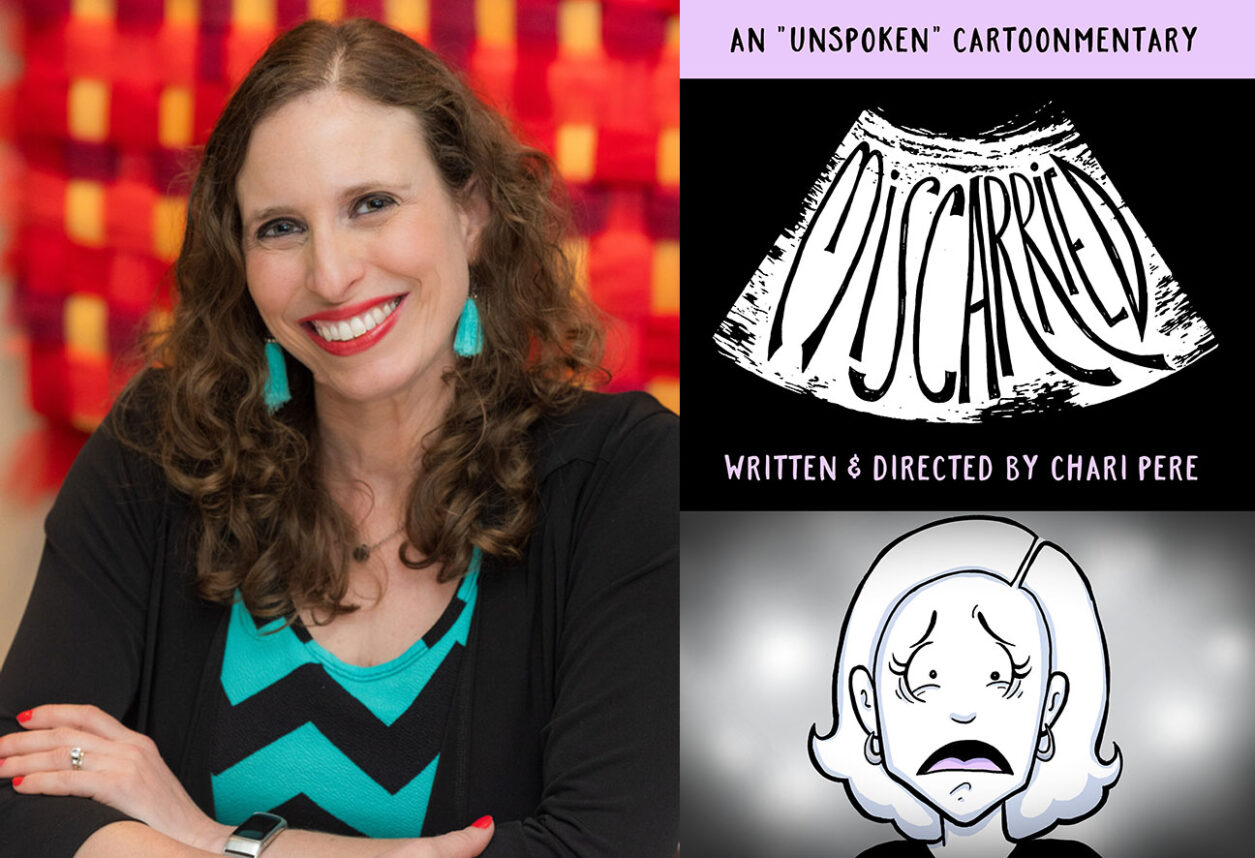 Screenshot from YouTube/The Mizrahi Project
Screenshot from YouTube/The Mizrahi Project There are some people whose contributions are so indispensable that their names are preceded with “the.” A decade and a half ago, someone introduced me to Faryar “Frank” Nikbakht at a Holocaust commemoration event. “The Frank Nikbakht?” I asked in wonder. I had heard about this inimitable community leader for years; his knowledge, research and diplomatic (and political) behind-the-scenes advocacy was nearly unparalleled. And that helps explain why my community of Iranian American Jews suffered such a major blow last week when Nikbakht lost his battle with cancer on June 12 in Los Angeles, at age 68. If you don’t believe me, here’s what one of his closest friends, longtime community activist Pooya Dayanim, posted on Facebook the night Nikbakht passed:
“A part of me died today. My mentor, friend and brother passed away. He was a true prince of Persian Jews … an Iranian rebel and a Jewish hero. His service to Iran, Jewry and the cause of freedom and democracy for over 50 years is too voluminous to list. There will be no other.”
Dayanim was right. There probably will be no other like Nikbakht. What was it about him that has broken the collective heart of our community?
Perhaps it was the fact that he was, in the words of his dear friend, journalist Karmel Melamed, “an encyclopedia” of knowledge. I’m deeply grateful to Melamed for having provided me with so much information about Nikbakht that he (Melamed) spent years researching.
According to Melamed, Nikbakht was an expert on Iranian Jewish history. He was also deeply knowledgeable about the Holocaust. And he knew nearly everything about post-revolutionary Iran, which is especially impressive given that he lived outside the country, as a protected refugee (the United States granted him asylum in the 1980s) the past few decades. In hindsight, Nikbakht knew more about the ayatollahs in Iran than they knew about themselves.
It was a well-known fact that he sacrificed professional pursuits and monetary success for a lifetime of pro bono work for causes related to Iranian Jewry, minorities in Iran and opposition to the regime.
Perhaps it was because he devoted nearly every waking hour to our community. It was a well-known fact that he sacrificed professional pursuits and monetary success for a lifetime of pro bono work for causes related to Iranian Jewry, minorities in Iran and opposition to the regime. His volunteer contributions can’t be measured by hours, but by decades.
In fact, I only recently learned that Nikbakht was a part-time realtor. I guess I had taken it for granted that he wasn’t paid for his indefatigable activism.
Perhaps my community still can’t believe Nikbakht is gone because he was a bona fide maverick. Several decades ago, Iranian Jews living outside Iran practiced tremendous caution with regard to publicly criticizing the regime, exposing its antisemitic rhetoric and actions, or publicly discussing anything negatively related to the thousands of Jews who remain in Iran. To do so was not only considered a taboo, but a danger. The [silent] golden rule among Iranian Jews in the Iranian diaspora was that any public discussion of Jews in Iran would put those Jews at grave risk of persecution, arrest or even execution.
But Nikbakht completely shattered that precedent. He will be remembered for his tireless advocacy in 1999-2000 in securing the release of “the Shiraz 13” — Iranian Jews the regime had falsely accused of spying for Israel and who were slated for execution. Nikbakht and a small group of other local Iranian Jewish activists devoted a great deal of time to running an international campaign that worked with many Jewish organizations and American diplomats to save “the Shiraz 13.” The efforts proved successful; miraculously, the men were saved (though they faced prison sentences).
He also proved a maverick by exposing the regime’s antisemitism — particularly the vicious antisemitism post-revolutionary Iran has spouted through state-run media since 1979. Nikbakht founded the Los Angeles-based Committee for Religious Minority Rights in Iran and was also former public affairs director of the now-defunct Council of Iranian American Jewish Organizations. The latter organization afforded him particular access to American lawmakers in order to advocate for Iranian Jewry and expose the regime’s antisemitism.
And there was no one better to volunteer for the Los Angeles-based “Center for Iranian Jewish Oral History.” Nikbakht spent countless hours collecting video testimonials from Jews about life in Iran before the revolution. That also explains why he was an indispensable contributor to the magnificent 2002 book, “Esther’s Children: A Portrait of Iranian Jews,” which beautifully chronicles the history of Iranian Jewry.
I decided to ask some of his closest friends to reflect on this extraordinary man, for whom a community-wide memorial was held at Stephen S. Wise Temple on June 21. The reflections below are merely a drop in the ocean of friends, colleagues and grateful admirers of Faryar Nikbakht, z”l. I only wish I could have included touching words from all who loved him.
“I do not know if he knew it or not, [but] Faryar was the prince of our little community,” said Dariush Fakheri, former president of the International Judea Foundation (SIAMAK). “Every aspect of Faryar’s life, emotions, memories, relationships, wisdom, knowledge, pains and pleasures, will live on those of us and countless others who consider him a mentor and a friend, a humble intellectual with an innocent and gentle soul, with a soothing smile, and a calm manner; the Mozart of symphonies of justice and wisdom and truth.”
I asked Bijan Khalili, the visionary publisher, activist and founder of Ketab bookstore, to reflect on his dear friend: “This is how I can explain his opinions and his acts and his life altogether: He believed, ‘The truth is beauty and beauty is the truth’ and he fought for it at any price,” said Khalili.
Well-known journalist, author and activist Homa Sarshar said: “Faryar was a man of honor and integrity. With a great passion for humanity at large and a big heart for minorities’ rights to freedom and equality. He did not stop his mission until his last days. He has been a valuable asset to the Center for Iranian Jewish Oral history and his research and interviews will remain in the Oral History Departments of UCLA, Tel Aviv University, Library of Congress as well as Stanford University’s Iranian Archive) as his legacy.”
Her son, Houman Sarshar, an independent scholar and the editor of “Esther’s Children,” also reflected on Nikbakht’s legacy: “Faryar was a dedicated scholar who pursued his research with passion and relentless curiosity. He spent years not only documenting the history of Jewish life in Iran, but also collecting the oral history of this ancient community. His scholarship is sure to remain valuable to researchers in the field for years to come, and his untimely passing is a loss to us all.”
Like all those who loved Nikbakht, Melamed is still grieving. “Faryar Nikbakht was among the most prolific social justice champions for Iranian Jews and other Iranian religious minorities in the last four decades that was totally underappreciated,” he said. “This was a very special man who never pursued family life, or personal financial gain, or fame or even public accolades for his tireless volunteer work to expose and fight back against the vile Jew hatred propagated by the Islamic regime in Iran. His satisfaction purely came from humbly serving the Jewish community by very publicly fighting the Iranian regime’s campaigns targeting Jews, the regime’s sickening promotion of Holocaust denial and their constant genocidal calls for Israel’s destruction.”
And then, there is Dayanim, as well as George Harounian, two of Nikbakht’s closest friends. “Faryar was the prime example of an Iranian born Jew, who understood Iranian political history and also was proud of his Jewishness and Israel. I am proud to have known him as a friend and as someone who taught me so much,” said Harounian. “His research and writings spread the world over and were read and respected by policy makers and analysts,” said Dayanim. Saving the Shiraz 13, according to Dayanim, “was a major chapter of modern Iranian Jewish history. This effort would not have succeeded without Faryar. He will not be forgotten.”
He gave us too much and immortalized our history too lovingly to ever fade into memory.
No, Nikbakht will not be forgotten. Simply put, he gave us too much and immortalized our history too lovingly to ever fade into memory. Thank you, Mr. Nikbakht.
Tabby Refael is a Los Angeles-based writer, speaker, and civic action activist. Follow her on Twitter @TabbyRefael






















 More news and opinions than at a Shabbat dinner, right in your inbox.
More news and opinions than at a Shabbat dinner, right in your inbox.